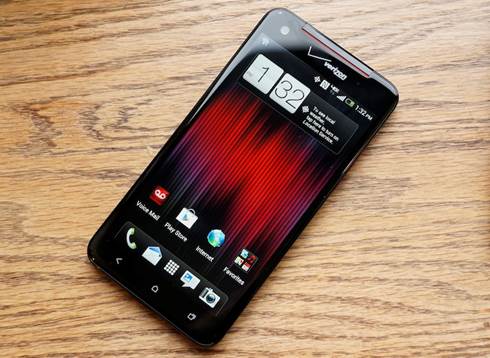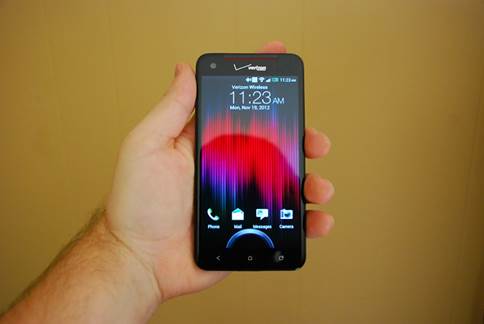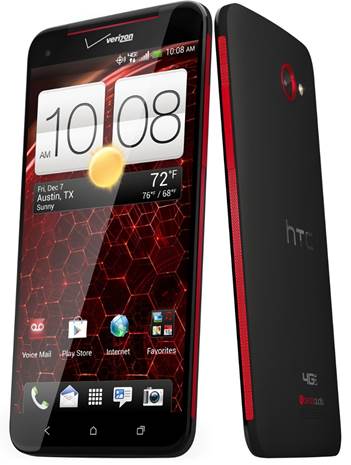Guanine, adenine, thymine, cytosine Android?
The Droid DNA – the latest version of Verizon's Droid series - may not actually
contain any real nucleic acid, but that does not make this flagship
manufactured by HTC weak.
Hardware
The company has a knack for thinking outside
the rectangular box and making phones with smart design – the Sensation series
and the Touch Diamond but it seems to have taken up the focus to another notch.
The One series is beautifully crafted and each model acts as an indicator of
intelligence of HTC's devotion and innovation; without missing the beat, it is
connected to the colorful and impressive Windows Phone 8X, which has been
confirmed by Microsoft. This bit of background information is added to
emphasize one important thing: HTC does not throw away enthusiasm for the Droid
DNA. Everything about the phone – even the edges inspired by Ferrari – ensures
luxury and comfortable experience. We were impressed by its beauty like when
you first watched the One X with your own eyes. It is a pretty incredible
device and is stably built which will not cause us to worry about durability,
because it has aluminum on the sides and soft polycarbonate at the back which
is the similar material used on the 8X. (Unfortunately, it is also a magnet for
fingerprint smudges). Gorilla Glass 2 adds charm to the screen with the promise
of preventing this beautiful screen from scratches.

Currently,
the DNA only has one color choice: black with red accents.
Currently, the DNA only has one color
choice: black with red accents. The two colors have become HTC’s main
decorations for years, so it is not a big shock as this will be the default
selection for the Big Red. It also correlates with Beats Audio color scheme, so
it is the perfect combination for all stakeholders. The red is not arbitrary
and goes quite well with the black, emphasizing the power button, earpiece,
camera and the edges (as we mentioned earlier, the same grid edge design clearly
inspired by Ferrari, and we fully support that decision). Those who worry about
the huge size of the Galaxy Note II will have the same hesitation for the
initial 5-inch DNA, but this special device is not trying to compete in the
same category with its rivals. HTC has gone astray when it stressed that DNA is
"a smartphone, not a phablet", and obviously we can confirm that
statement. Keep it at your ear during a call will not give the same uncomfortable
feeling about the inconvenience as the Note II does, and it's much easier to
use one-handed tasks without special keyboard or dialpad special. In fact, the
DNA’s shape parameters remind us of what you will find on the One X and Samsung
Galaxy S III: with a width of 70.5mm (2.78 inches), it is only 0.6mm wider than
the One X and 0.1mm narrower than the GS3. The height of 141mm (5.55 inches) is
higher than that of the two other phones. At its thickest point, the DNA’s size
is about 9.73mm (0.38 inch), which is slightly thicker than the One X (8.9mm)
and the GS (8.6mm), but the back tilts slightly to meet the 4mm thick tapered
edge. We waited until the phone required a certain initial adjustment, but we
found that the DNA fit perfectly in the palm of your hand and it felt just
great.

The
DNA fits perfectly in the palm of your hand and it felt just great.
On the back is an indicator of DNA about
HTC's recent change in design strategy. If you recall, the Windows Phone 8X
offers light curve (think of "the smiling face" when looking at the
phone from the side) without making the phone become too thick, thanks to the
pyramid-shape for which the designers stacked the components inside the body,
HTC has confirmed to us that the same methodology can also be used for the Droid
DNA. And as we waited from the high-end devices manufactured by HTC, the back is
completely seamless, so the 2020mAh battery cannot be swapped. Near the top,
you'll find the 8MP autofocus ImageSense camera strengthened by a LED flash on
the right and a notification LED on the left. The light on the back is somewhat
unpopular with smartphones – we cannot remember any device that had been
decorated with two lights like that but whoever often puts the phone face-down
will actually see a lot of use from this additional supplement. Close to the
bottom are Verizon's recent LTE and Beats Audio logo, although fortunately they
do not take much space. At first, you'll see the standard 3 buttons below the
screen of HTC (back, home and recent apps), with a front camera, earpiece and
the proximity sensor above. An LED light is hidden under the speaker grid.
Gorilla Glass covers almost the entire front panel, but there is a U-shaped space
at the top for the earpiece; this particular section of the phone seems to be poorly
designed, because the earpiece and the small area underneath it seems totally
inept and corrupts the cohesiveness of the overall design.

On
the back is an indicator of DNA about HTC's recent change in design strategy
However, in an effort to make the phone
look nice, HTC has made a volume rocker almost completely flush with the phone’s
body itself, making it somewhat difficult to press. The power button,
unfortunately placed at the center top, is designed in a similar way. The two
buttons are made of anodized aluminum and their equal position to help them
blend better, making the edges more aesthetically interesting, so you'll just
need to decide whether it is worth paying a little bit about being useful.
Surrounding the top of the DNA, the power button is strengthened by a micro-SIM
tray on the right side and a 3.5mm headphone jack on the left. We found a small
glitch after taking the phone out of the box: the micro-USB/MHL port below is
covered with a plastic lid, which takes more effort to close than usual.
According to HTC, this is done to keep the phone waterproof, in a similar
fashion as the J Butterfly. As we have seen on most Japanese phones before, the
network in that country has very high standards when it comes to protecting
your phone from water, so HTC and Verizon have chosen to accept such standards
for the DNA. If you buy the phone, it is important to remember that it is
compatible with the Qi, so it can be worth investing in a certified wireless
charging pad instead of removing the lid often. (We used the Energizer pad and Nokia
Fatboy pillow to charge the DNA, and they both work great).
While focusing on the “wireless” topic, we
should note that the Droid DNA also has dual-band 802.11a/b/g/n, NFC and
compatibility with HTC Media Link HD to HDMI capable Wireless mirroring. If you
do not mind the wired route, an MHL adapter will easily work here in its place.
Unfortunately, the USB OTG is not officially supported.
Last but not least, the storage is limited
to 16GB with no option for storage expansion, a bad decision from HTC.
Obviously the idea of avoiding microSD slot is not new, and HTC has done this
many times before – the One X + worth being blamed for the same thing but we
felt that choosing this special was offered by Verizon, because the J Butterfly
(the Japanese copy of the DNA) allows storage can expansion.